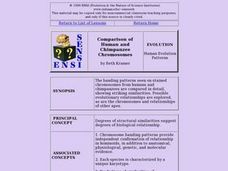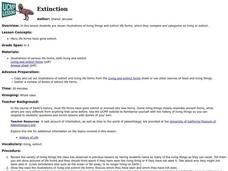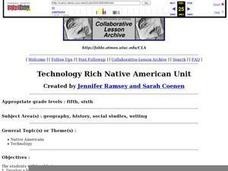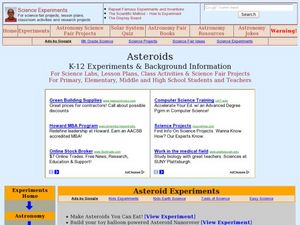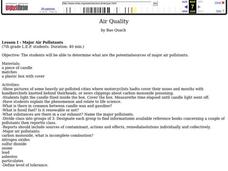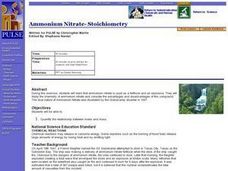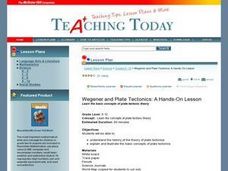Curated OER
Hometown Ecology
Students examine how ecology is at work in their own community. As a class, they identify what they already know about the world around them and discuss how they personally affect the environment. Using magazines, newspapers and the...
Curated OER
Wind Power and Your Community
Students acquire knowledge about hydropower, diesel power, wind power, and how they are currently used in the north. They share what they have learned through a jigsaw activity.
Curated OER
Natural Selection
Eighth graders define natural selection and adaptation. They simulate natural selection within a species and relate the elements of natural selection to the simulation. They analyze the results of natural selection in terms of...
Curated OER
Important, Interesting and Serious Exercise
In this word usage worksheet, students explore the meanings of three words, important, interesting, and serious. Students complete fifteen sentences with the correct words and write four sentences of their own.
Curated OER
Do you see what I see?
Students examine the importance of making and recording observations and accurately describing an object. In this biology lesson students work in groups and report to the class what they learned.
Curated OER
The History of Rice
Third graders explore the history of rice. In this history of rice lesson students use a timeline to help determine important events in the spread of rice throughout the world. They use a map to locate rice production in the United States.
Curated OER
The History of Rice
Fourth graders investigate the history of rice by drawing a timeline of important dates. In this food history lesson, 4th graders research the history of rice, where it came from, and who first used it for food. Students create a...
Curated OER
Beach Theme
Students practice b words, search for sea shells, write on beach post cards, and more, all to learn about the beach. Students also wear sun hats around the room.
Curated OER
Weather Tools
Students explore Earth science by participating in a weather identification activity. For this scientific instrument lesson, students identify several weather related tools such as the weather vane, thermometer and rain gauge. Students...
Curated OER
Pyrites
Students examine the mineral pyrite and discover the differences between it and gold. In this mineral lesson students identify minerals using their common properties.
Curated OER
Comparison of Human and Chimpanzee Chromosomes
Students actively engage in the careful analysis of chromosome banding patterns and identify examples of inversion in homologous chromosomes.
Curated OER
Extinction
Students peruse illustrations of living things and extinct life forms, which they compare and categorize as living or extinct.
Curated OER
Technology Rich Native American Unit
Student groups retell stories from Iroquois storytellers. They role-play Iroquois women, men and children and explain their roles. They read "Knots on a Counting Rope" and make up their own stories. They create timelines. They visit a...
Curated OER
Asteroids
Young scholars examine a potential asteroid impact site. They describe evidence and theories for extinction events.
Curated OER
Air Quality
Students determine potential sources of major air pollutants, explain how acid rain is generated and how it affects the environment, discuss global warming, and explore protective role of ozone and cause of ozone layer thinning. Lessons...
Curated OER
The Rock Cycle
Third graders study the 3 main types of rocks: igneous, sedimentary, metamorphic. They examine samples of these types of rocks and discuss ways to tell what kind of rock each is. They take notes and draw pictures in their science...
Curated OER
Famous Rock Groups
Students define igneous, metamorphic, and sedimentary, and use rock identification books to identify igneous, metamorphic, and sedimentary rocks. Students then discuss which rocks early man would have found useful for tool creation.
Curated OER
World War II: Bombs and Peace
Middle schoolers explore the final events and end of World War II. They examine the community impact of such events as the dropping of the dropping of atomic bombs, and President Roosevelt's death. Students prepare a presentation.
Curated OER
Hominoid Skull Comparison
Students are provided with evidence used to support evolutionary theory. They are introduced to classification by using primates as an example. Students read article related to Hominoid Skull Comparison and write a summary about the...
Curated OER
Plants of the Past
Fourth graders explore ecosystems by examining plants of the past. They discuss ways in which we interact with plants in our daily lives. Students discuss the role plants play in providing food for animals and the significance they had...
Curated OER
Ammonium Nitrate- Stoichiometry
Students quantify the relationship between moles and mass. They comprehend that ammonium nitrate is used as a fertilizer and an explosive. Students study the chemistry of ammonium nitrate and consider the advantages and disadvantages of...
Curated OER
World Geography: Climate Change Round Table
Students are able to explain the suspected causes of relatively recent climate changes, specifically the observed global warming. They discuss how unusual or extreme global warming disrupts the balance of the earth's geo-spheres.
Curated OER
Where in the World is Carbon Dixoide?
Students conduct experiments designed to detect the presence of CO2 by using a BTB that changes color (blue to yellow) in the presence of CO2. First, students experiment with the CO2 from combining vinegar and baking soda. In part two,...
Curated OER
Wegener and Plate Tectonics: A Hands-On Lesson
Students are introduced to and experiment with the basic concepts of plate tectonic theory as well as assess the history of the theory of plate tectonics. They explain and illustrate the basic concepts through diagrams and models of...
Other popular searches
- Geologic Time and Fossils
- Index Fossils Geologic Time
- Time Lines Fossils
- Fossils and Time Worksheets
- Geologic Time & Fossils Lab
- Fossils Geological Time Line












